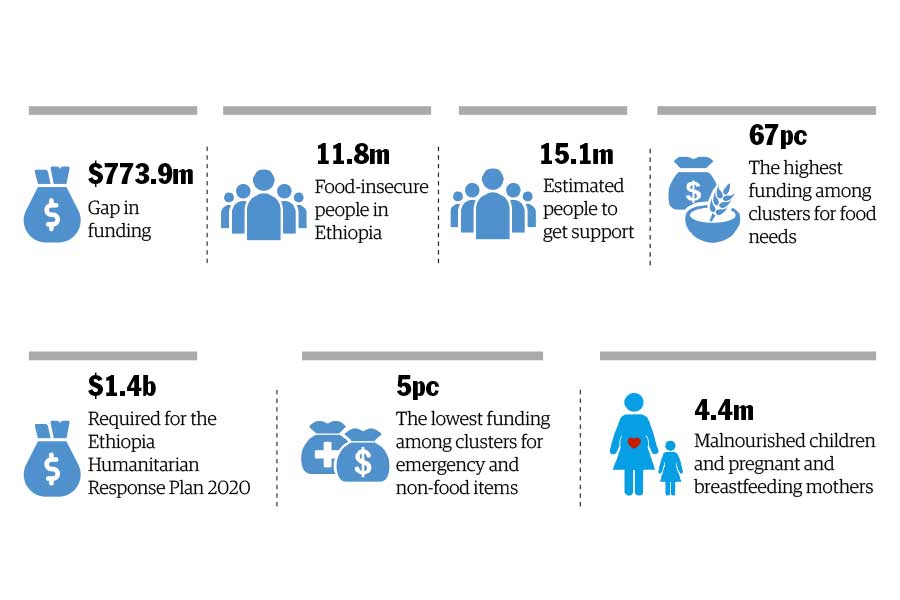
Jan 14 , 2023
By Alen Tesfaye
It is important to note that allowing foreign banks to operate in the market would not be the lasting solution for the foreign currency shortage, writes Alen Tesfaye. He is a lawyer and business management professional with an LL.B from Addis Ababa University and a MiM from The University of Winnipeg. He can be reached at: (alenbrussa@gmail.com)
Like many other developing countries, Ethiopia has been facing a foreign currency shortage for several years that has significantly impacted the economy, hindering the ability of businesses and individuals to make international transactions. In addition, it has led to increased inflation, a reduction in foreign direct investment, and other adverse effects.
The federal government has taken steps to address the shortage of foreign currency by liberalising the sector in recent years. Plans to float the exchange rate are underway. However, the effects of these policies on the foreign currency shortage are complex and not fully understood.
Allowing foreign banks to operate in the country helps to alleviate the shortage and increases foreign investments.
Kenyan Bank KCB Group, Deutsche Bank and Standard Chartered Bank expressed interest in opening branches in Ethiopia. Their interest indicates that foreign banks recognise the potential of the economy and the banking sector. However, to fully leverage this opportunity and increase the potential benefits, the government will need to create an enabling environment that fosters market growth while protecting the domestic banking industry.
Recent reports have suggested that the government may allow foreign banks to own up to 30pc of local banks' shares. Such a policy change differs from the policy that allows foreign banks to open branches in the country. This move, if implemented, could boost domestic banking by bringing in much-needed capital and expertise. However, it is essential to ensure that foreign banks do not dominate the market consequently crippling domestic ones.
There are also potential negative effects of allowing foreign banks to operate. They may impact the domestic banking industry's market share, leading them to closure. Foreign banks may not be as tightly regulated, which can lead to increased financial risk. This is a concern in a country where the banking sector is relatively underdeveloped and the regulatory framework is not as robust as the developed countries. In addition, they may have different cultural and linguistic backgrounds, making it difficult to understand the local market and adapt their products and services accordingly. This can lead to a less effective banking system and make it more difficult for local businesses and individuals to access these banking services.
It is important to note that allowing foreign banks to operate in the market would not be the lasting solution for the foreign currency shortage. Relying on that has a drawback impact. It can make the economy overly dependent on foreign institutions, making it more vulnerable to fluctuations in policies or strategies.
To address the foreign currency deficiency, the government should consider promoting domestic production by creating a favourable environment for businesses and investors. The ideal solution would be to develop policies to improve exports and increase the tourism sector, opening up to the international markets and promoting domestic financial institutions. Most importantly, it is essential to take a comprehensive approach to address the root causes of the shortage rather than concentrating on the symptoms. By taking a multifaceted approach, the country can ensure that the economy is not overly dependent on foreign banks.
In addition to pioneering the banking sector to foreign banks, the central bank plans to liberalise its exchange rate regime within the next three years. A floating exchange rate system is one of the standard market-oriented regimes used globally, usually adopted to align the foreign currency market with the market-determined equilibrium rate. It allows a greater degree of monetary policy autonomy and flexibility.
However, there are some concerns while implementing such a system in Ethiopia.
The country is facing economic challenges that may exacerbate and complicate other issues. Some experts argue the country should only follow a pegged or fixed exchange rate regime, as a move to greater flexibility would result in losing policy credibility and promoting inflation, leading to political upheaval. The World Bank and IMF have been urging for exchange rate regime change to a floating rate system to encourage exports and tackle the growth of the parallel market.
A more flexible exchange rate regime, where the market is determined by demand and supply, would make the national currency more competitive, bring about structural change and enhance productivity. However, experts warn that implementing such a system in Ethiopia, which has a large balance of payments deficit and a lack of a stable political environment, could lead to the further economic crisis, inflation, a widening gap between the parallel and official market, and political turmoil. Certain preconditions must be met before implementing a flexible exchange rate regime, such as a deep and liquid foreign exchange market, adequate payment and settlement systems, and building the capacity of market participants to manage exchange rate risks.
While the government's recent efforts to open up the banking sector to foreign banks and liberalise the exchange rate regime, it is crucial to conduct detailed research and establish a solid legal and institutional framework to mitigate potential adverse effects while noting that these policies alone may only be a temporary solution.
PUBLISHED ON
Jan 14,2023 [ VOL
23 , NO
1185]


Fortune News | Jul 12,2021

Fortune News | Jan 18,2020

Fortune News | Sep 21,2019

Fortune News | Jun 12,2021

Fortune News | Jul 18,2020

Fortune News | Oct 11,2020

Viewpoints | Jun 17,2023

Fortune News | Nov 26,2022

Commentaries | Jun 24,2023

Radar | Oct 03,2020

Photo Gallery | 96545 Views | May 06,2019

Photo Gallery | 88826 Views | Apr 26,2019

My Opinion | 67134 Views | Aug 14,2021

Commentaries | 65750 Views | Oct 02,2021

Feb 24 , 2024 . By MUNIR SHEMSU
Abel Yeshitila, a real estate developer with a 12-year track record, finds himself unable to sell homes in his latest venture. Despite slash...

Feb 10 , 2024 . By MUNIR SHEMSU
In his last week's address to Parliament, Prime Minister Abiy Ahmed (PhD) painted a picture of an economy...

Jan 7 , 2024
In the realm of international finance and diplomacy, few cities hold the distinction that Addis Abeba doe...

Sep 30 , 2023 . By AKSAH ITALO
On a chilly morning outside Ke'Geberew Market, Yeshi Chane, a 35-year-old mother cradling her seven-month-old baby, stands amidst the throng...

Apr 20 , 2024
In a departure from its traditionally opaque practices, the National Bank of Ethiopia...

Apr 13 , 2024
In the hushed corridors of the legislative house on Lorenzo Te'azaz Road (Arat Kilo)...

Apr 6 , 2024
In a rather unsettling turn of events, the state-owned Commercial Bank of Ethiopia (C...

Mar 30 , 2024
Ethiopian authorities find themselves at a crossroads in the shadow of a global econo...

Apr 20 , 2024
Ethiopia's economic reform negotiations with the International Monetary Fund (IMF) are in their fourth round, taking place in Washington, D...

Apr 20 , 2024 . By BERSABEH GEBRE
An undercurrent of controversy surrounds the appointment of founding members of Amhara Bank after regulat...

An ambitious cooperative housing initiative designed to provide thousands with affordable homes is mired...

Apr 20 , 2024 . By AKSAH ITALO
Ethiopia's juice manufacturers confront formidable economic challenges following the reclassification of...